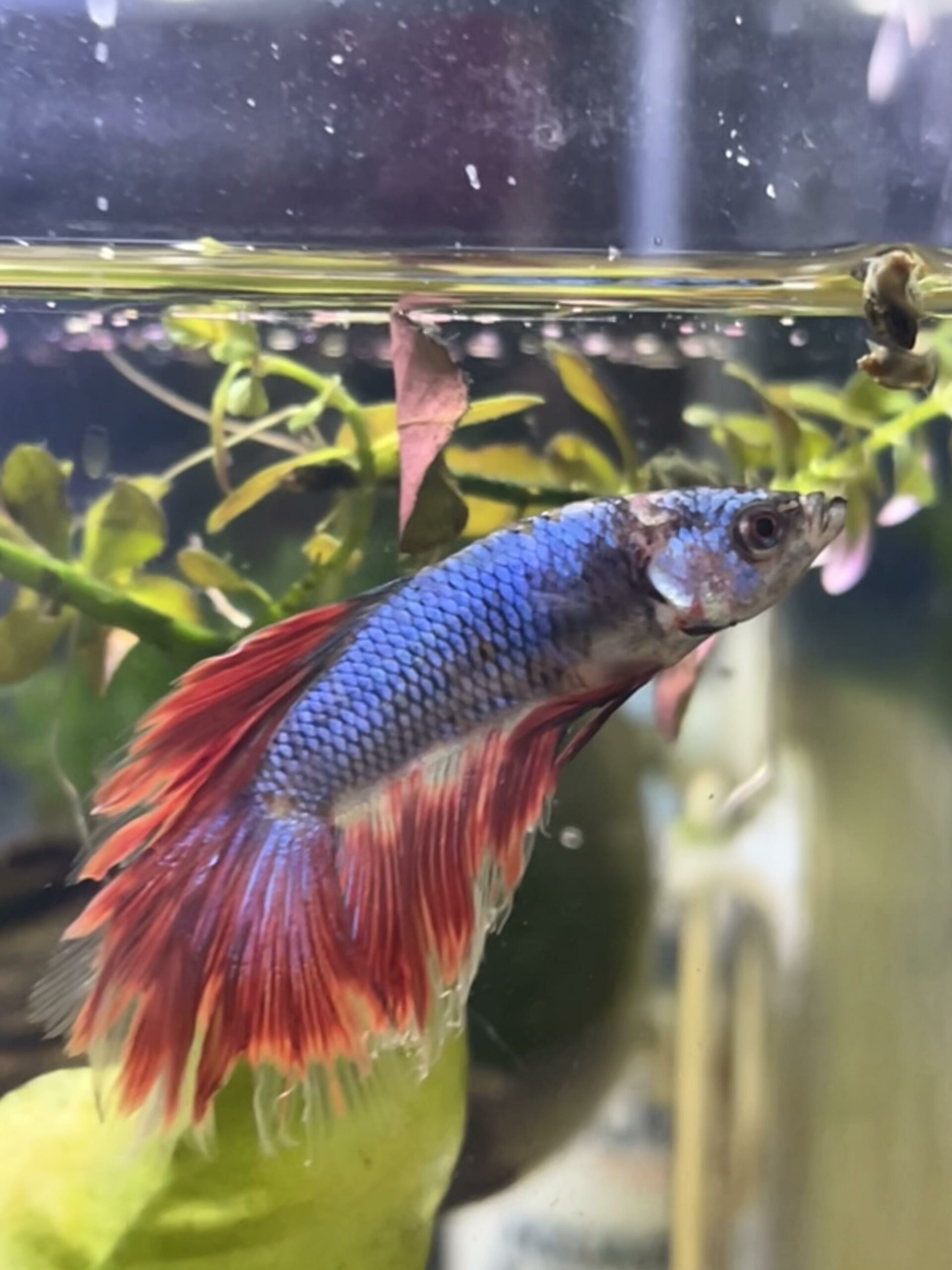There are several reasons why a betta fish may turn white:
1. Stress: Stress is a common reason for betta fish to change color. This could be due to changes in their environment, such as water temperature or water quality.
2. Poor water conditions: Bettas require clean water with appropriate pH and temperature levels. If the water quality deteriorates, it can lead to stress and a change in the fish’s color.
3. Aging: As bettas age, their coloration may fade and become less vibrant. It is a natural process.
4. Illness or disease: Some diseases or infections can cause a betta fish to lose pigmentation and turn white. If your fish also displays other symptoms like lethargy, loss of appetite, or changes in behavior, it may indicate an underlying health issue.
5. Genetic factors: Sometimes, betta fish are naturally white or can change color due to specific genetic traits.
If you notice that your betta fish is turning white, it is important to monitor its behavior, water conditions, and overall health. Ensure that the aquarium water is clean, maintain appropriate water parameters, and consider consulting a veterinarian if you suspect any health issues.
Know More About: why is my betta fish turning white
Betta fish are known for their vibrant colors and striking appearance, so it can be concerning when you notice your beloved fish turning white. Several factors could contribute to this change in coloration, and understanding them can help you provide the best care for your betta.
One possible reason for your betta fish turning white is a condition known as “blanching.” Blanching occurs when pigment cells in the betta’s skin, called chromatophores, become inactive, leading to a loss of color. This can often be caused by stress, inadequate diet, or an unhealthy environment.
Stress is a major factor in the color changes of bettas. These fish are highly sensitive creatures that require a calm and peaceful environment. Factors such as loud noises, bright lights, or constant exposure to humans can cause stress and lead to color fading. It is crucial to ensure that your betta aquarium is placed in a quiet area and that the water parameters are in the optimal range.
Another reason for the loss of coloration in bettas can be related to their diet. These fish require a balanced and nutritious diet to maintain their vibrant hues. A lack of essential nutrients, particularly those that contribute to pigmentation, can result in fading colors. Ensure that you are feeding your betta a varied diet of high-quality pellets, frozen or live foods, and supplementing with treats such as bloodworms or brine shrimp. It is essential to offer a proper diet to help maintain the fish’s health and appearance.
Water quality plays a significant role in the overall well-being of your betta fish, including its coloration. Poor water conditions can be stressful for bettas and can lead to a loss of color. Make sure to conduct regular water tests and maintain appropriate levels of ammonia, nitrite, and nitrate. Frequent water changes and the use of a reliable water conditioner are crucial to providing a clean and safe environment for your betta.
Bacterial and fungal infections can also cause your betta’s color to fade and turn white. These infections often occur due to poor water quality or injuries. Keeping a close eye on your betta for any signs of disease, such as frayed fins, loss of appetite, or unusual behavior, is crucial. If you suspect an infection, consult a veterinarian or an aquatic specialist for an accurate diagnosis and appropriate treatment.
Parasites, such as ichthyophthirius multifiliis or white spot disease, can also cause your betta fish to turn white. These pesky organisms attach themselves to the fish’s skin, causing irritation and discoloration. Treating your betta with the appropriate medication, following the instructions carefully, can help eliminate parasites and restore your fish’s natural colors.
In summary, a variety of factors can contribute to your betta fish turning white. Stress, inadequate diet, water quality issues, bacterial or fungal infections, and parasites can all play a role. It is important to create a calm and suitable environment for your betta, provide a balanced and nutritious diet, and maintain optimal water parameters to ensure the health and vibrant colors of your beloved fish.
FAQs on why is my betta fish turning white
1. Why is my betta fish turning white?
Betta fish may turn white due to a genetic mutation called “marble gene” that causes their color to change over time. It is completely natural and harmless.
2. I just purchased a betta fish, and it’s turning white. Is this normal?
Yes, it is normal for betta fish to change their color over time. Many bettas start off with vibrant colors and gradually turn white due to genetic factors.
3. Can stress cause my betta fish to turn white?
Yes, stress is known to affect betta fish’s coloration. If your fish is kept in unfavorable conditions or subjected to sudden changes in water temperature or quality, it may result in their colors fading or turning white.
4. Is a white betta fish an unhealthy fish?
Not necessarily. While color changes can indicate health issues, such as stress or disease, a naturally occurring change to white is usually not a cause for concern. It is important to monitor your fish’s behavior and overall health to ensure their well-being.
5. What other factors can contribute to my betta fish turning white?
In addition to genetics and stress, poor water conditions, inadequate nutrition, or old age can also play a role in the color change of betta fish.
6. How can I prevent my betta fish from turning white?
Providing a stable and appropriate environment for your betta fish is key. Ensure clean water, suitable temperature, good nutrition, and minimal stressors to maintain their vibrant colors as long as possible.
7. Can I do anything to bring back the original color of my betta fish?
Unfortunately, once a betta fish has naturally turned white, it is generally not reversible. However, ensuring optimal care and minimizing stress can help maintain their overall health and well-being.
8. Should I be concerned if only parts of my betta fish are turning white?
Partial color changes within a betta fish are still considered normal. Some individuals may exhibit patches of white or lighter coloring, but as long as their behavior and health remain unaffected, there is usually no cause for alarm.
9. What should I do if my betta fish turns white suddenly and displays other signs of illness?
If your betta fish experiences a rapid color change accompanied by unusual behavior, loss of appetite, or other signs of illness, it is essential to consult a veterinarian who specializes in fish care. Prompt professional advice is vital in such situations.
10. What is the best way to care for a betta fish to help maintain its natural color?
To ensure the longevity of your betta fish’s vibrant color, provide a clean tank with appropriate water parameters, regular feeding of nutritious food, and a stress-free environment. Regular maintenance, including water changes and monitoring, is crucial for their overall well-being.

